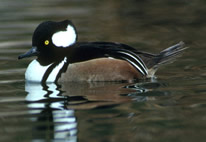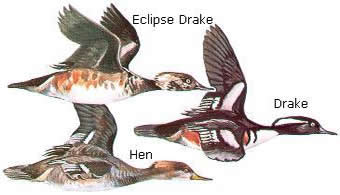Wildlife - Species

Species Specific Regulations
Hooded Merganser
Licenses: Hunting License required. Migratory Bird Hunting and Conservation Stamp (Federal Duck Stamp) that is validated by the hunter signing the stamp in ink across the face of the stamp
Limits: Please see Migratory Bird Regulations for any game zones restrictions or Limitations.
Hooded Merganser (Lophodytes cucullatus)

Description
Hooded mergansers have an exaggerated crest and a bold black and white pattern with chestnut flanks.
Average Size
Hooded mergansers have an average length of 18 inches and an average weight of 1 1/2 pounds.
Range
Hooded mergansers can be found in all four flyways. They are found in South Carolina primarily during the winter months, but some birds are year round residents.
Preferred Habitat
Hooded mergansers are closely associated with forested wetland systems. In the southeast they are found in oak-cypress-tupelo forests. In the winter months they are prefer shallow freshwater and brackish bays, estuaries, tidal creeks, and ponds.
Wings

Food Habits
These mergansers typically consume aquatic insects, fish, and crustaceans.
Reproduction
The female selects a suitable nest cavity in a live or dead tree that is over or very close to water. She does not excavate a cavity, but instead finds one resulting from dead tree trunks, broken of limbs, and at the top of broken off tree trunks. Hens will also use nest boxes. She will then lay 5-13 nearly spherical white eggs.
Sound
Drakes makes a deep rolling sound, and hen gives a hoarse gack. Usually silent, except during courtship.
Behavior
- Short rapid wingstrokes create an impression of great speed.
- Highly aquatic, awkward on land.
- Often seen in pairs, or very small flocks.
Citations, Publications and Literature
U.S. Fish & Wildlife Service, Federal Duck Stamp Office Presents: North American Waterfowl (Adobe PDF file)
Dugger, B. D., K. M. Dugger and L. H. Fredrickson. 2009. Hooded Merganser (Lophodytes cucullatus), The Birds of North America Online (A. Poole, Ed.). Ithaca: Cornell Lab of Ornithology; Retrieved from the Birds of North America Online
South Carolina waterfowl hunters 16 and older are required by state law to obtain a state migratory waterfowl permit and Migratory Game Bird permit. Both permits must be in the hunter's possession while hunting or transporting legal waterfowl. A state waterfowl permit is included with the Lifetime Senior, Lifetime Gratis and Disability Licenses. S.C. residents who hold a Lifetime Senior or Lifetime Gratis License are not required to have a Migratory Game Bird permit.
National Migratory Bird Harvest Information Program (HIP)
The waterfowl permits and HIP permits are available from select DNR offices and from hunting and fishing license agents.
